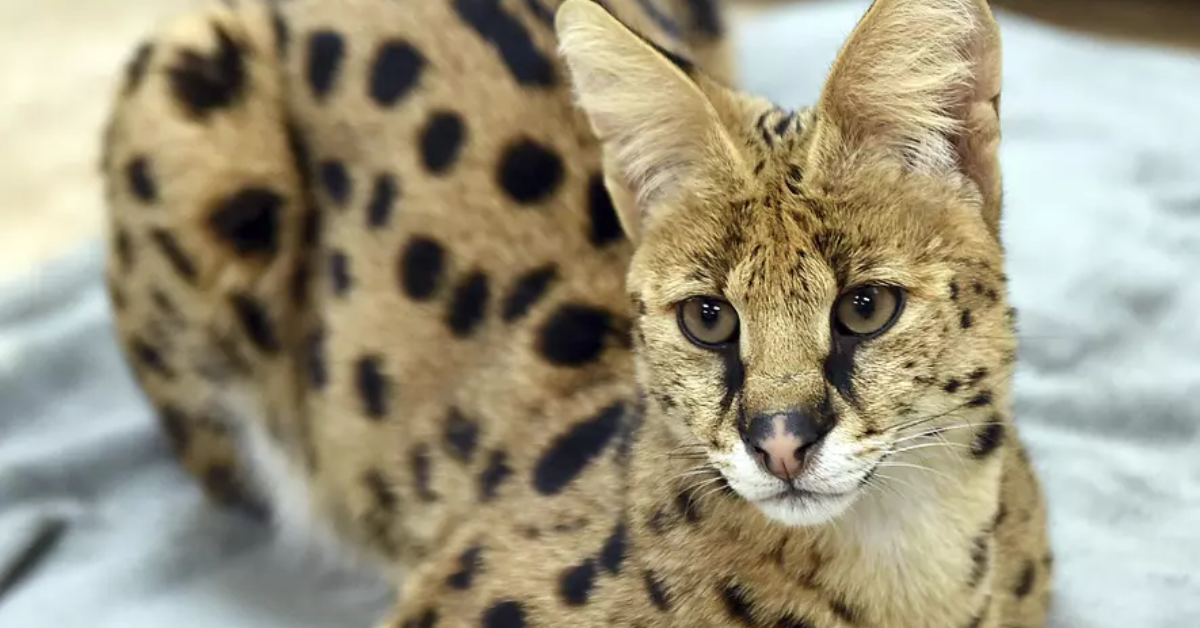In a dramatic turn of events, a recent raid on drug-trafficking suspects in Pennsylvania has revealed something far more unexpected than the authorities anticipated. As law enforcement agents swooped in on the suspects involved in illegal drug operations, they discovered African wildcats being kept under perilous conditions. This unusual find has sparked concerns over the increasing involvement of exotic animals in illegal activities, leading to a growing debate over the need for stricter laws and enforcement.
The raid, which took place in the small town of Easton, was part of a broader operation targeting a drug trafficking ring believed to be supplying large quantities of narcotics throughout the region. Authorities were initially focused on uncovering drug paraphernalia, weapons, and financial records related to the operations.
However, what they found instead was far from ordinary. Inside the suspect’s property, the authorities discovered several African wildcats, including servals and caracals, which are typically found in the wilds of sub-Saharan Africa.
The wildcats were kept in cages that seemed inadequate for their size and natural behavior. The authorities observed the animals were malnourished and lacked adequate space for movement, highlighting the illegal trade of exotic animals alongside drug trafficking.
Wildlife experts who were called in to assess the situation confirmed the animals were being illegally kept and bred in captivity, which could pose significant threats to their well-being and survival. Keeping these animals in non-native environments is not only cruel but also illegal in many parts of the United States, where regulations on the ownership of exotic animals are strict.
While law enforcement was primarily focused on dismantling the drug network, the discovery of the African wildcats has added another layer of complexity to an already challenging case. These animals are often trafficked for their pelts, for use in illegal wildlife trades, and even as exotic pets. The revelation of this connection between drug trafficking and wildlife trafficking underscores a disturbing trend: criminals are finding multiple ways to profit from illegal activities, often without regard for the law or the welfare of animals involved.
Exotic animal trafficking is a serious crime, as it can contribute to the depletion of species that are already endangered. Servals, caracals, and other African wildcats face threats to their habitats in the wild, and capturing them for illegal trade only exacerbates the situation.
Wildlife conservationists have long warned against the growing illegal wildlife trade, which involves not just big cats like lions and tigers, but also smaller species like the African wildcats found in Pennsylvania. As these animals are taken from their natural environments, they are often subjected to harsh living conditions, poor nutrition, and even abuse, making it harder for them to survive in captivity or be reintroduced into the wild.
In the case of the Pennsylvania raid, the animals were seized by animal protection agencies, and the suspects in question are now facing charges related to both drug trafficking and illegal possession of exotic animals. The authorities are investigating the link between these two illegal industries and how they might be interrelated.
Experts suggest that drug traffickers often use wildlife trafficking as a means of laundering money or diversifying their income sources. Given the vast sums of money involved in both the drug trade and the exotic pet trade, this could be a key tactic for criminals trying to stay under the radar of law enforcement.
The case has brought to light the gaps in regulations surrounding the trade and ownership of exotic animals in the United States. While many states have laws in place to regulate the ownership of such animals, others are less stringent, allowing individuals to possess them under certain conditions. This patchwork of laws has made it difficult for authorities to track the movement of exotic animals and prevent their illegal trade. Wildlife advocates are now calling for stronger federal legislation to close these loopholes and make it harder for criminals to exploit these animals.
Furthermore, animal rights groups are pushing for tougher enforcement of existing laws, as well as increased public awareness about the dangers of keeping exotic animals as pets. Many of these animals are not suited for life in captivity and can pose significant dangers to both their owners and the public.
Servals and caracals, for example, are known for their sharp claws and powerful hunting instincts, which can make them difficult to manage in a household setting. Despite their popularity as exotic pets, they require specialized care that most pet owners are unable to provide.
The discovery of African wildcats in Pennsylvania has also sparked a conversation about the broader issue of animal cruelty. While the spotlight is often on larger exotic animals like lions, tigers, and elephants, the reality is that smaller species like servals and caracals are also subjected to exploitation for profit. The illegal trade of these animals is driven by a demand from wealthy individuals who desire rare and unusual pets. This demand fuels the growth of the black market for exotic animals, which is estimated to be worth billions of dollars globally.
As authorities continue to investigate the drug trafficking operation in Pennsylvania, they are also working with wildlife conservation groups to ensure the animals are properly rehabilitated and placed in reputable sanctuaries. The African wildcats will need specialized care and attention to help them recover from the trauma they have experienced. The authorities are also seeking to educate the public about the dangers of supporting the illegal wildlife trade and encourage responsible pet ownership.
The Pennsylvania raid serves as a reminder of the often-overlooked connection between illegal drug trafficking and the illicit trade of exotic animals. It highlights the need for stronger enforcement of laws regulating the ownership and trade of wildlife, as well as increased awareness of the cruelty involved in the exploitation of these animals. By shedding light on these issues, authorities hope to prevent further exploitation and ensure the protection of vulnerable species from illegal trafficking and abuse.








